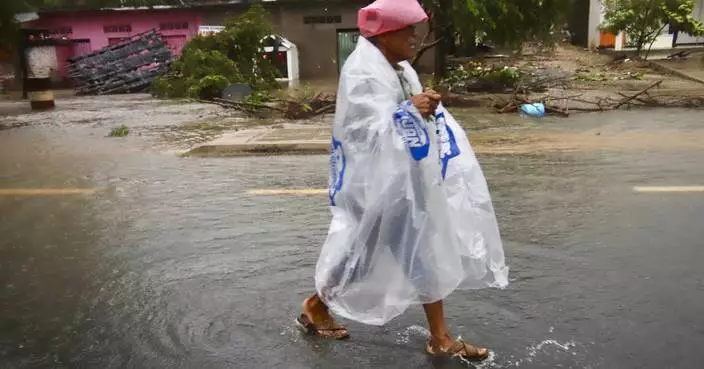The carbon fiber hull of the experimental submersible that imploded en route to the wreckage of the Titanic had imperfections dating to the manufacturing process and behaved differently after a loud bang was heard on one of the dives the year before the tragedy, an engineer with the National Transportation Safety Board said Wednesday.
Engineer Don Kramer told a Coast Guard panel there were wrinkles, porosity and voids in the carbon fiber used for the pressure hull of OceanGate's Titan submersible. Two different types of sensors on Titan recorded the “loud acoustic event” that earlier witnesses testified about hearing on a dive on July 15, 2022, he said.
Click to Gallery
The carbon fiber hull of the experimental submersible that imploded en route to the wreckage of the Titanic had imperfections dating to the manufacturing process and behaved differently after a loud bang was heard on one of the dives the year before the tragedy, an engineer with the National Transportation Safety Board said Wednesday.
Don Kramer, National Transportation Safety Board engineer, testifies Wednesday, Sept. 25, 2024, at the U.S. Coast Guard Marine Board of Investigation hearing into the June 2023 loss of the Titan submersible, in North Charleston, S.C. (Petty Officer 2nd Class Kate Kilroy/U.S. Coast Guard via AP, Pool)
Don Kramer, National Transportation Safety Board engineer, right, testifies Wednesday, Sept. 25, 2024, at the U.S. Coast Guard Marine Board of Investigation hearing into the June 2023 loss of the Titan submersible, in North Charleston, S.C. (Petty Officer 2nd Class Kate Kilroy/U.S. Coast Guard via AP, Pool)
In a still from from a video animation provided by the United States Coast Guard an illustration of the Titan submersible, right, is shown near the ocean floor of the Atlantic Ocean, as June 18, 2023 communications between the submersible and the support vessel Polar Prince, not shown, are represented at left. (United States Coast Guard via AP)
Gim Kang, special counsel for the Coast Guard's Titan Submersible Marine Board of Investigation, listens during the formal hearing inside the Charleston County Council Chambers, Monday, Sept. 23, 2024, in North Charleston, S.C. (Laura Bilson/The Post And Courier via AP, Pool)
This June 2023 image provided by Pelagic Research Services shows remains of the Titan submersible on the floor of the Atlantic Ocean. (Pelagic Research Services via AP)
Members of the Coast Guard's Titan Submersible Marine Board of Investigation listen during the formal hearing inside the Charleston County Council Chambers, Monday, Sept. 23, 2024, in North Charleston, S.C. (Laura Bilson/The Post And Courier via AP, Pool)
Hull pieces recovered after the tragedy showed substantial delamination of the layers of carbon fiber, which were bonded to create the hull of the experimental submersible, he said.
OceanGate co-founder Stockton Rush was among the five people who died when the Titan submersible imploded in June 2023.
Kramer's statements were followed by testimony from William Kohnen, a longtime submersibles expert and key members of the Marine Technology Society. Kohnen emerged as a critic of OceanGate in the aftermath of the implosion and has described the disaster as preventable.
On Wednesday, Kohnen pushed back at the idea the Titan could not have been thoroughly tested before use because of its experimental nature. He also said OceanGate's operations raised concerns among many people in the industry.
Kohnen said “I don't think many people ever told Stockton no.” He described Rush as not receptive to outside scrutiny.
“This is not something where we don’t want you to do it. We want you to do it right," Kohnen said.
The Coast Guard opened a public hearing earlier this month that is part of a high level investigation into the cause of the implosion. Some of the testimony has focused on the submersible's carbon fiber construction, which was unusual. Other testimony focused on the troubled nature of the company.
Coast Guard officials noted at the start of the hearing that the submersible had not been independently reviewed, as is standard practice. That and Titan’s unusual design subjected it to scrutiny in the undersea exploration community.
Earlier in the hearing, former OceanGate operations director David Lochridge said he frequently clashed with Rush and felt the company was committed only to making money.
Lochridge and other previous witnesses painted a picture of a company that was impatient to get its unconventionally designed craft into the water. The accident set off a worldwide debate about the future of private undersea exploration.
The hearing is expected to run through Friday and include several more witnesses, some of whom were closely connected to the company.
The co-founder of the company told the Coast Guard panel Monday that he hoped a silver lining of the disaster is that it will inspire a renewed interest in exploration, including the deepest waters of the world’s oceans. Businessman Guillermo Sohnlein, who helped found OceanGate with Rush, ultimately left the company before the Titan disaster.
OceanGate, based in Washington state, suspended its operations after the implosion. The company has no full-time employees currently, but has been represented by an attorney during the hearing.
During the submersible’s final dive on June 18, 2023, the crew lost contact after an exchange of texts about Titan’s depth and weight as it descended. The support ship Polar Prince then sent repeated messages asking if Titan could still see the ship on its onboard display.
One of the last messages from Titan’s crew to Polar Prince before the submersible imploded stated, “all good here,” according to a visual re-creation presented earlier in the hearing.
When the submersible was reported overdue, rescuers rushed ships, planes and other equipment to an area about 435 miles (700 kilometers) south of St. John’s, Newfoundland. Wreckage of the Titan was subsequently found on the ocean floor about 330 yards (300 meters) off the bow of the Titanic, Coast Guard officials said. No one on board survived.

Don Kramer, National Transportation Safety Board engineer, right, testifies Wednesday, Sept. 25, 2024, at the U.S. Coast Guard Marine Board of Investigation hearing into the June 2023 loss of the Titan submersible, in North Charleston, S.C. (Petty Officer 2nd Class Kate Kilroy/U.S. Coast Guard via AP, Pool)

Don Kramer, National Transportation Safety Board engineer, testifies Wednesday, Sept. 25, 2024, at the U.S. Coast Guard Marine Board of Investigation hearing into the June 2023 loss of the Titan submersible, in North Charleston, S.C. (Petty Officer 2nd Class Kate Kilroy/U.S. Coast Guard via AP, Pool)

Don Kramer, National Transportation Safety Board engineer, right, testifies Wednesday, Sept. 25, 2024, at the U.S. Coast Guard Marine Board of Investigation hearing into the June 2023 loss of the Titan submersible, in North Charleston, S.C. (Petty Officer 2nd Class Kate Kilroy/U.S. Coast Guard via AP, Pool)
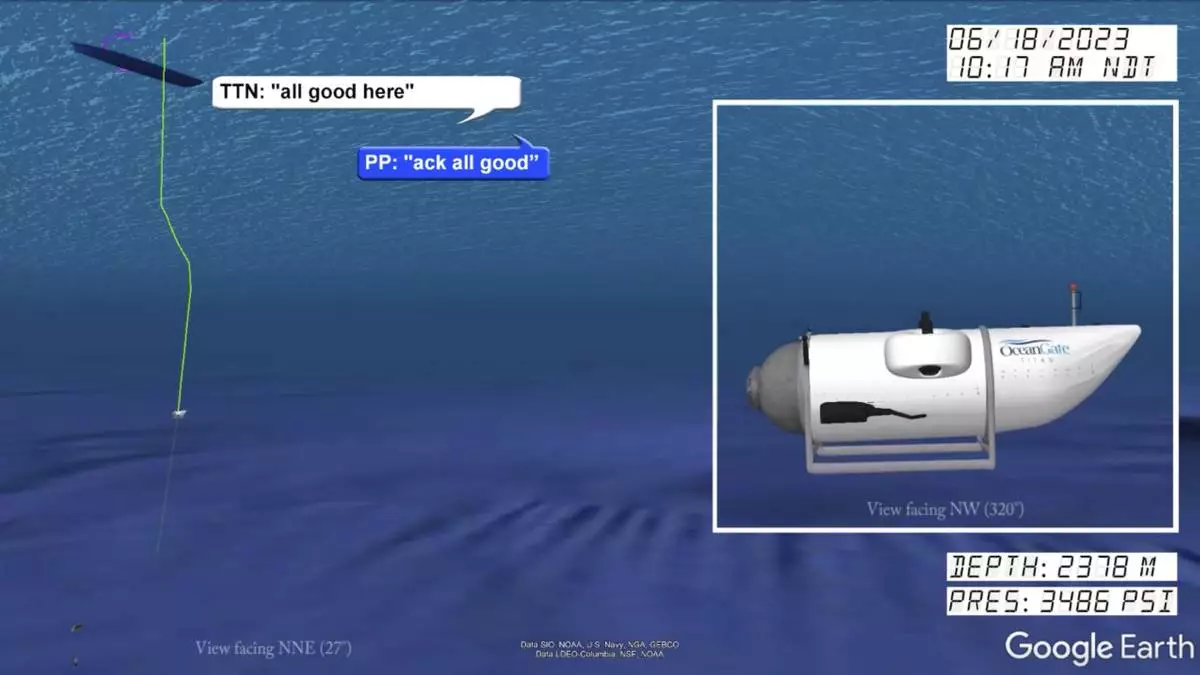
In a still from from a video animation provided by the United States Coast Guard an illustration of the Titan submersible, right, is shown near the ocean floor of the Atlantic Ocean, as June 18, 2023 communications between the submersible and the support vessel Polar Prince, not shown, are represented at left. (United States Coast Guard via AP)

Gim Kang, special counsel for the Coast Guard's Titan Submersible Marine Board of Investigation, listens during the formal hearing inside the Charleston County Council Chambers, Monday, Sept. 23, 2024, in North Charleston, S.C. (Laura Bilson/The Post And Courier via AP, Pool)
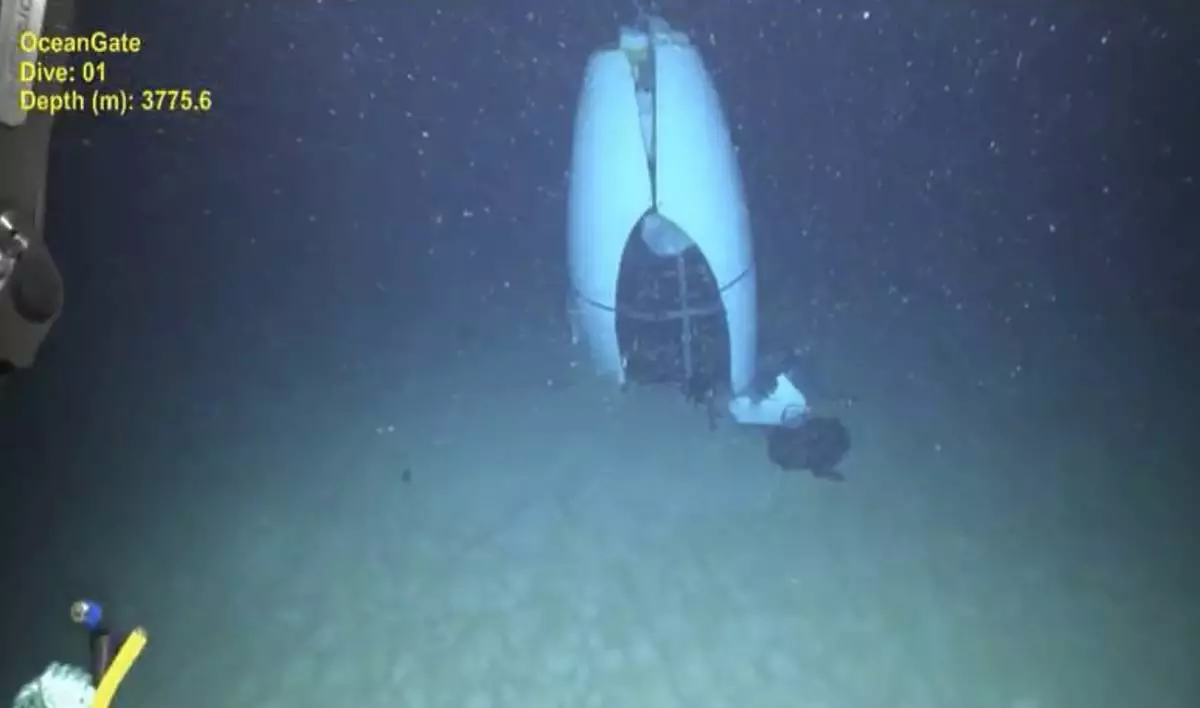
This June 2023 image provided by Pelagic Research Services shows remains of the Titan submersible on the floor of the Atlantic Ocean. (Pelagic Research Services via AP)

Members of the Coast Guard's Titan Submersible Marine Board of Investigation listen during the formal hearing inside the Charleston County Council Chambers, Monday, Sept. 23, 2024, in North Charleston, S.C. (Laura Bilson/The Post And Courier via AP, Pool)
TEL AVIV, Israel (AP) — The Israeli military is preparing for a possible ground operation in Lebanon, the Israeli army chief said Wednesday as Hezbollah fired dozens of rockets into Israel and a missile aimed at Tel Aviv that was the militant group's deepest strike yet.
Addressing troops on the northern border, Chief of Staff Lt. Gen. Herzi Halevi said the latest airstrikes were designed to ”prepare the ground for your possible entry and to continue degrading Hezbollah.”
In an apparent reference to the missile fired at Tel Aviv, he told troops: "Today, Hezbollah expanded its range of fire, and later today, they will receive a very strong response. Prepare yourselves.”
It was not clear whether Halevi was referring to a ground operation, airstrikes or some other form of retaliation against Hezbollah, which is Lebanon’s strongest political force and, with backing from Iran, is widely considered the top paramilitary group in the Arab world.
The Israeli military has said in recent days it had no immediate plans for a ground invasion. Halevi’s comments were the strongest yet suggesting troops could move in.
With hostilities intensifying, the Israeli military said Wednesday it would activate two reserve brigades for missions in the north — another sign that Israel plans tougher action.
In the southern Israeli city of Eilat, a building at the port was struck by a drone, an attack that injured two people and was claimed by an umbrella group for Iranian-backed militias in Iraq. A second drone was intercepted, the Israeli military said.
Footage aired on Israeli media showed a plume of smoke in the area and at least one damaged building. The army said the drones were identified “approaching from the East.”
Tensions between Israel and Hezbollah have steadily escalated since war broke out 11 months ago between Israel and Hamas, another Iran-backed militant group. Hezbollah has been firing rockets, missiles and drones into northern Israel in solidarity with Palestinians in Gaza and Hamas. Israel has responded with increasingly heavy airstrikes and the targeted killing of Hezbollah commanders while threatening a wider operation.
Nearly a year of fighting had already displaced tens of thousands of people on both sides of the border before the recent escalation.
Israel has vowed to do whatever it takes to ensure its citizens can return to their homes in the north, while Hezbollah has said it will keep up its rocket attacks until there is a cease-fire in Gaza, something that appears increasingly remote.
To allow displaced Israelis to return to their homes, “we are preparing the process of a maneuver,” Halevi said.
U.S. Secretary of State Antony Blinken urged Israel and Hezbollah to step back, saying all-out war would be disastrous for the region and its people.
In New York for the annual U.N. General Assembly, Blinken said the U.S. was working with other partners on a temporary cease-fire plan to reduce tensions and allow Israelis and Lebanese to return to their homes in border areas.
U.S. officials say they are floating ideas but have not been specific. Some may be discussed at a special U.N. Security Council meeting on Lebanon that France called for later Wednesday.
Lebanon's health minister said more than 50 people were killed Wednesday in the continuing Israeli strikes, raising the death toll from the past three days to 615, with more than 2,000 wounded.
At Dar Al Amal hospital in the eastern city of Baalbek, Soumaya Moussawi lay in bed with her head bandaged and face bruised.
She had been sitting outside with relatives when warplanes started striking in the distance, she said.
“Then suddenly it hit next to us. We were all thrown in different directions,” she said. Two cousins and her father were killed, and another cousin was badly wounded.
This week has been the deadliest in Lebanon since the bruising 2006 monthlong war between Israel and Hezbollah.
Hezbollah said it fired a Qader 1 ballistic missile targeting the headquarters of Israel’s Mossad intelligence agency, which it blames for a recent string of targeted killings of its top commanders and for an attack last week in which explosives hidden in pagers and walkie-talkies killed dozens of people and wounded thousands, including many Hezbollah members.
Israeli military officials said they intercepted a surface-to-surface missile that set off air-raid sirens in Tel Aviv and across central Israel. There were no reports of casualties or damage. The military said it struck the launch site in southern Lebanon.
Israeli military spokesman Lt. Col. Nadav Shoshani said the missile fired Wednesday had a “heavy warhead” but declined to elaborate or confirm it was the type described by Hezbollah. He dismissed Hezbollah’s claim of targeting the Mossad headquarters just north of Tel Aviv as “psychological warfare.”
The Israeli military said it was the first time a projectile fired from Lebanon had reached central Israel. Hezbollah claimed to have targeted an intelligence base near Tel Aviv last month in an aerial attack, but there was no confirmation. Hamas repeatedly targeted Tel Aviv in the opening months of the war in Gaza.
The launch ratcheted up hostilities in a region that appeared to be teetering toward another all-out war, even as Israel continues to battle Hamas in the Gaza Strip.
The Iranian-made Qader is a medium-range surface-to-surface ballistic missile with multiple types and payloads. It can carry an explosive payload of up to 800 kilograms (1,760 pounds), according to the Washington-based Center for Strategic and International Studies. Iranian officials have described the liquid-fueled missile as having a range of 2,000 kilometers (1,240 miles).
Israel said Wednesday its air force had struck some 280 Hezbollah targets across Lebanon by early afternoon, including launchers used to fire rockets on the northern Israeli cities of Safed and Nahariya.
Fleeing families have flocked to Beirut and the coastal city of Sidon, sleeping in schools turned into shelters, as well as in cars, parks and along the beach. Some sought to leave the country, causing a traffic jam at the border with Syria.
The United Nations said more than 90,000 people have been displaced by five days of Israeli strikes. In all, 200,000 people have been displaced in Lebanon since Hezbollah began firing rockets into northern Israel nearly a year ago, drawing Israeli retaliation, according to the U.N. Office for the Coordination of Humanitarian Affairs.
Hezbollah’s latest strikes included dozens of rockets fired Wednesday into northern Israel, the military said.
Rocket fire over the past week has disrupted life for more than 1 million people across northern Israel, with schools closed and public gatherings restricted. Many restaurants and other businesses are shut in the coastal city of Haifa, and there are fewer people on the streets. Some who fled from communities near the border are coming under rocket fire again.
Israel has moved thousands of troops who had been serving in Gaza to the northern border. It says Hezbollah has some 150,000 rockets and missiles, including some capable of striking anywhere in Israel, and that the group has fired some 9,000 rockets and drones since last October.
Cross-border fire began ramping up Sunday after the pager and walkie-talkie bombings, which killed 39 people and wounded nearly 3,000, many of them civilians. Lebanon blamed Israel, but Israel did not confirm or deny responsibility.
The next day, Israel said its warplanes struck 1,600 Hezbollah targets, destroying cruise missiles, long- and short-range rockets and attack drones, including weapons concealed in private homes. The strikes racked up the highest one-day death toll in Lebanon since Israel and Hezbollah fought a bruising monthlong war in 2006.
Chehayeb reported from Beirut. Associated Press Writers Suleiman Amhaz in Baalbek, Lebanon, and Jon Gambrell in Dubai, United Arab Emirates, contributed to this report.
Follow AP’s war coverage at https://apnews.com/hub/israel-hamas-war

In this photo taken from video provided by Adar E Goldenberg, traces of presumably an attacking missile, right, and air defense missile, left, are seen in the air in Tel Aviv, Israel, Wednesday, Sept. 25, 2024. Hezbollah hurled dozens of projectiles into Israel early Wednesday, including a missile aimed at Tel Aviv that was the militant group's deepest strike yet and marked a further escalation after Israeli strikes on Lebanon killed hundreds of people. (Adar E Goldenberg via AP)

A man looks at a damaged house that was hit by a rocket fired from Lebanon, near Safed, northern Israel, on Wednesday, Sept. 25, 2024. (AP Photo//Leo Correa)

People look at a damaged house that was hit by a rocket fired from Lebanon, near Safed, northern Israel, on Wednesday, Sept. 25, 2024. (AP Photo//Leo Correa)
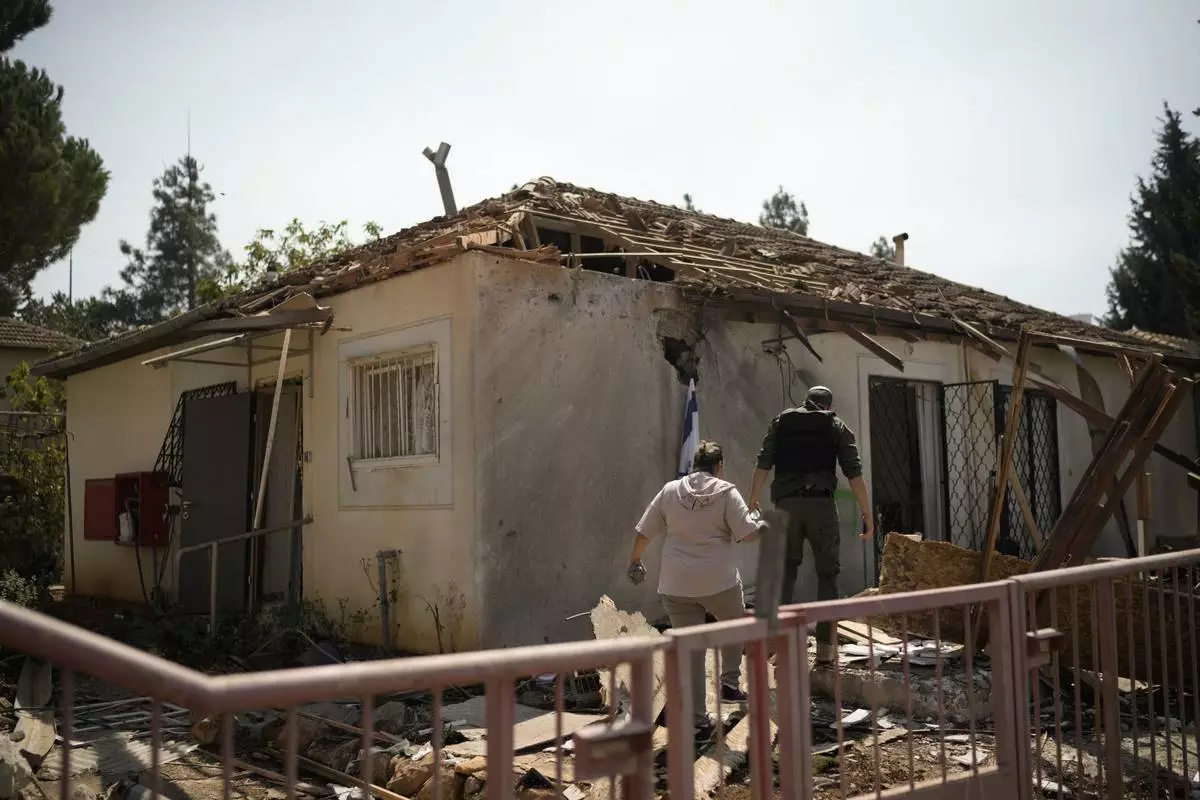
People look at a damaged house that was hit by a rocket fired from Lebanon, near Safed, northern Israel, on Wednesday, Sept. 25, 2024. (AP Photo//Leo Correa)

A damaged house that was hit by a rocket fired from Lebanon, near Safed, northern Israel, on Wednesday, Sept. 25, 2024. (AP Photo//Leo Correa)
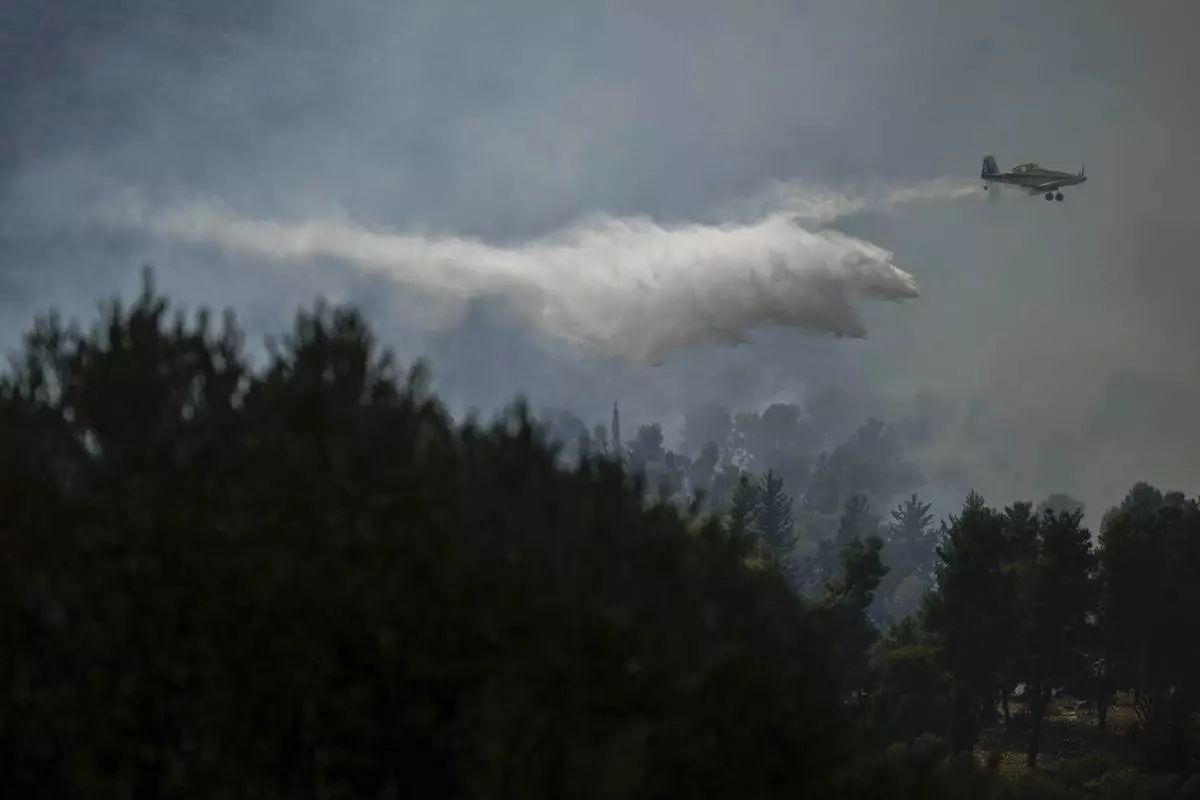
An Israeli firefighters plane uses a fire retardant to extinguish a fire after a rocket fired from Lebanon hit an open area near the city of Safed, northern Israel, on Wednesday, Sept. 25, 2024. (AP Photo/Leo Correa)
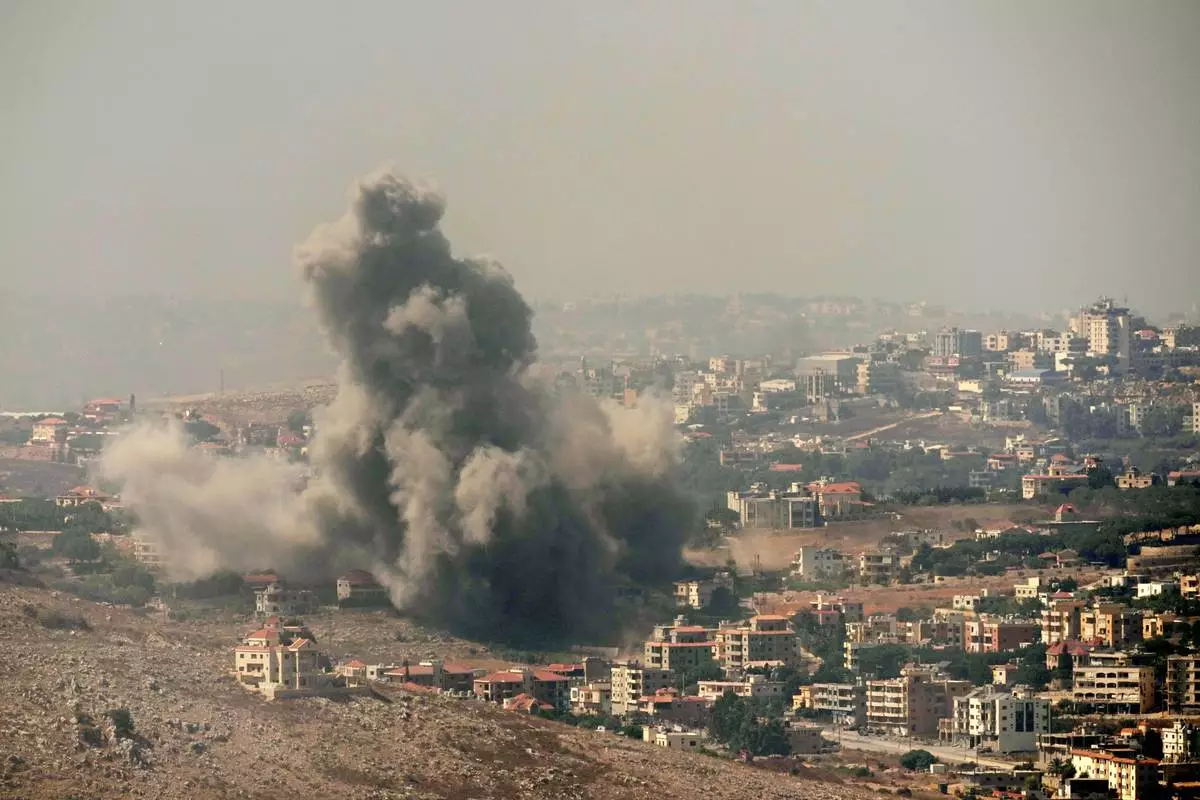
Smoke rises from Israeli airstrikes in the southern village of Kfar Rouman, seen from Marjayoun, south Lebanon, Wednesday, Sept. 25, 2024. (AP Photo/Hussein Malla)
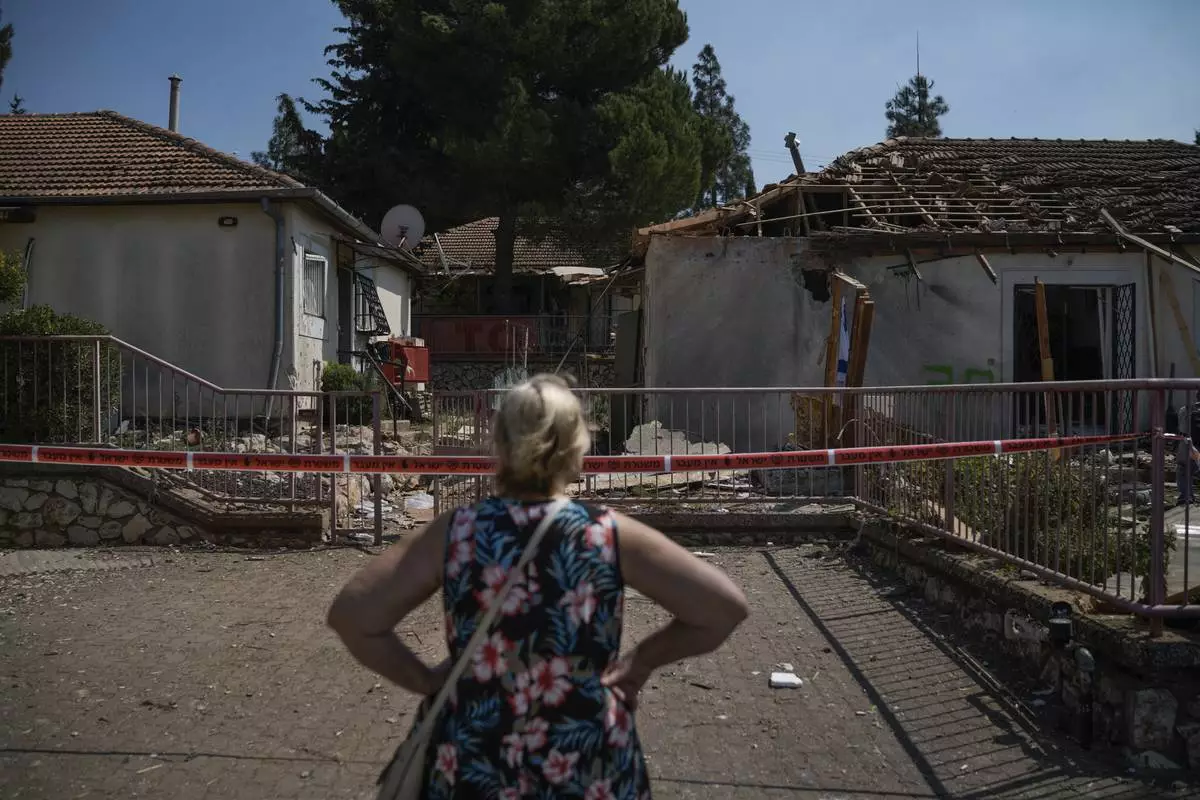
A woman looks at a damaged house that was hit by a rocket fired from Lebanon, near Safed, northern Israel, on Wednesday, Sept. 25, 2024. (AP Photo//Leo Correa)
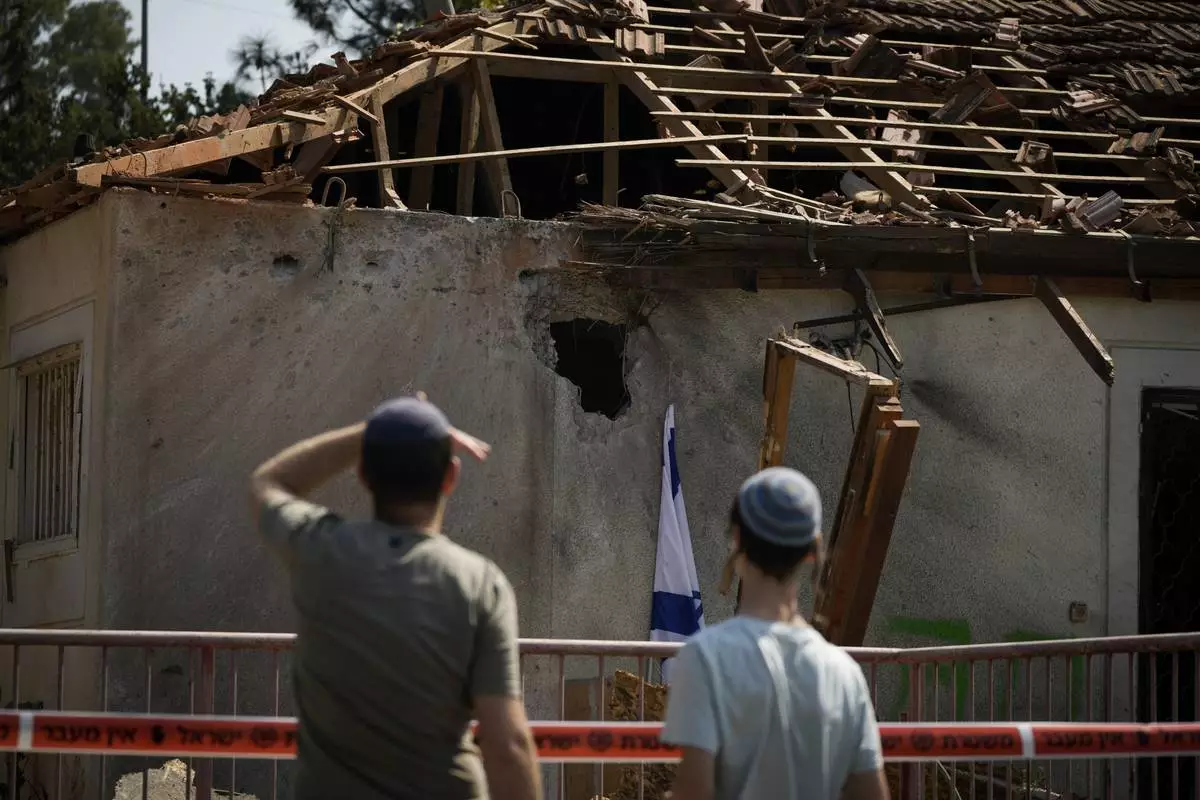
People look at a damaged house that was hit by a rocket fired from Lebanon, near Safed, northern Israel, on Wednesday, Sept. 25, 2024. (AP Photo//Leo Correa)

Israelis stay in a residential building bomb shelter to stay safe from rockets fired from Lebanon, in Kiryat Haim, northern Israel, on Tuesday, Sept. 24, 2024. (AP Photo/Baz Ratner)

Israelis rest in a residential building bomb shelter to stay safe from rockets fired from Lebanon, in Kiryat Haim, northern Israel, on Tuesday, Sept. 24, 2024. (AP Photo/Baz Ratner)

Israelis rest in a residential building bomb shelter to stay safe from rockets fired from Lebanon, in Kiryat Haim, northern Israel, on Tuesday, Sept. 24, 2024. (AP Photo/Baz Ratner)

Israelis sit next to a public bomb shelter to stay safe from rockets fired from Lebanon, in Haifa, northern Israel, on Tuesday, Sept. 24, 2024. (AP Photo/Baz Ratner)
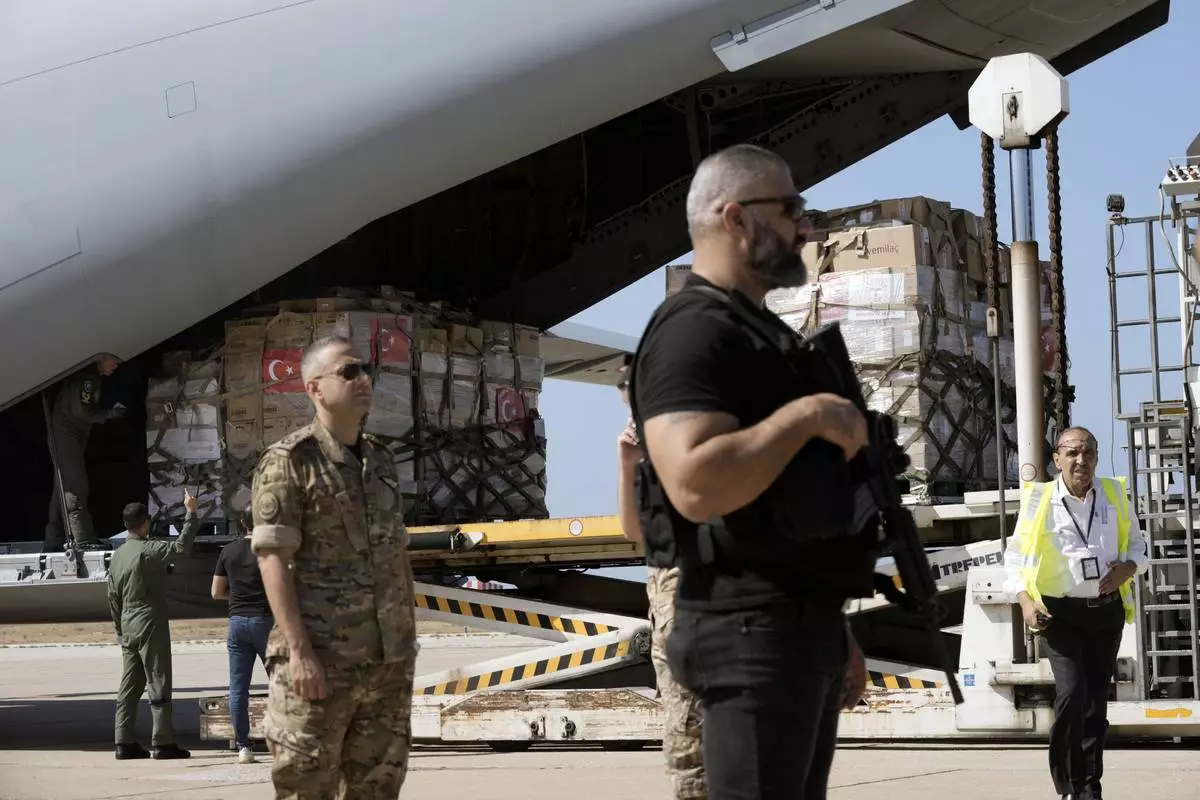
A Turkish Air Force airplane brings medical aid boxes at Beirut International airport, Wednesday, Sept. 25, 2024. (AP Photo/Bilal Hussein)
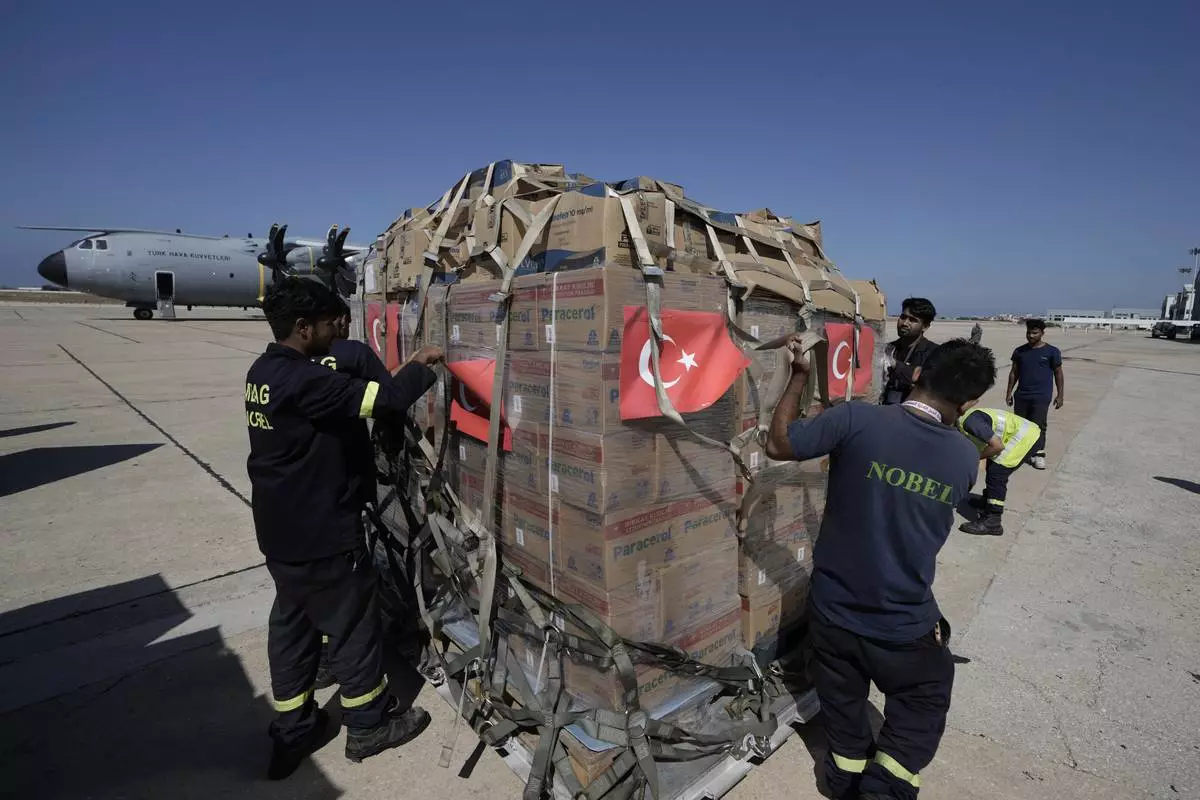
Workers unload Turkish medical aid boxes arriving at Beirut International airport, Wednesday, Sept. 25, 2024. (AP Photo/Bilal Hussein)
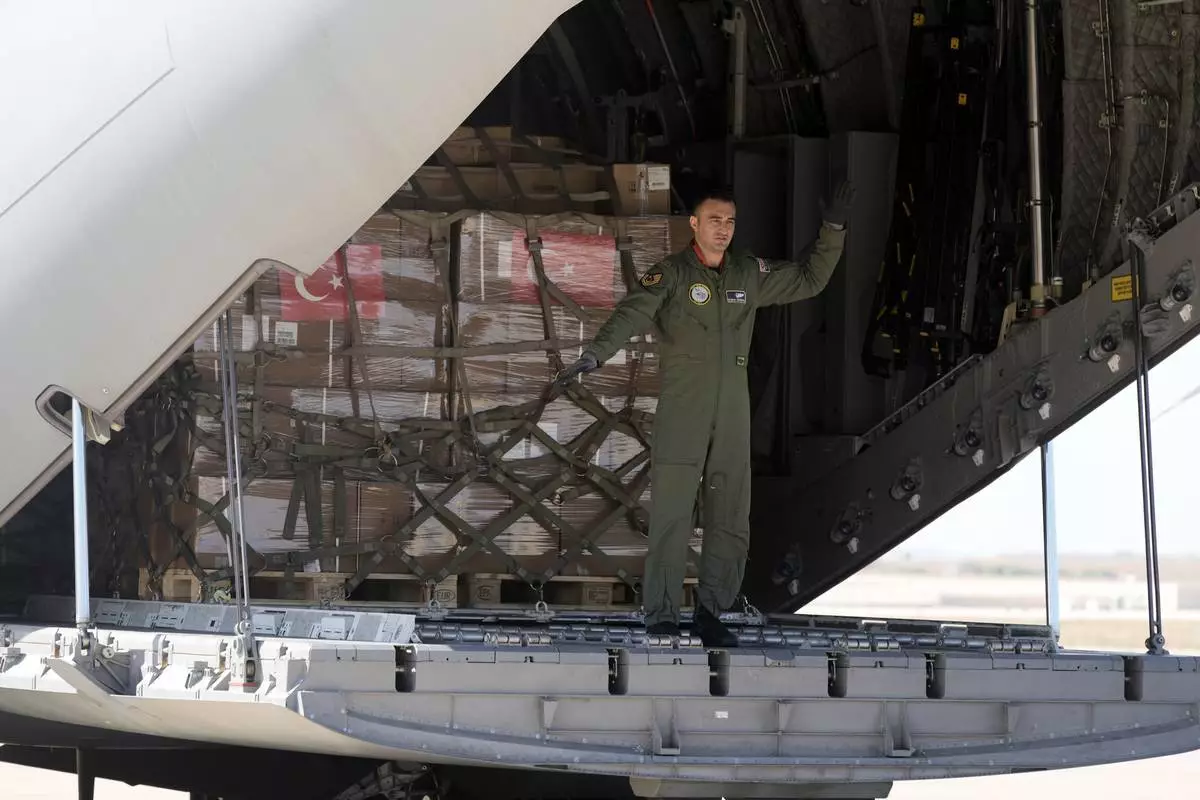
A Turkish Air Force personnel unloads medical aid boxes at Beirut airport, Wednesday, Sept. 25, 2024. (AP Photo/Bilal Hussein)
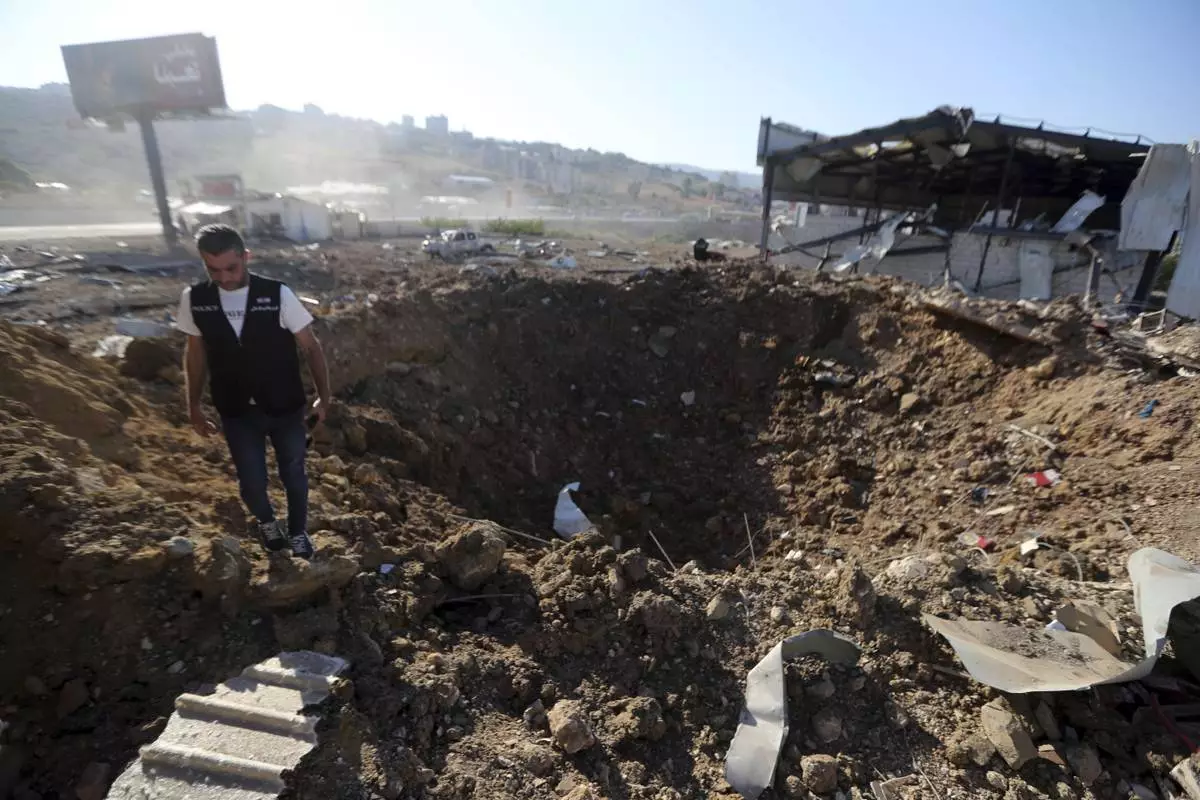
A Lebanese police intelligence stands near a crater at the site of an Israeli airstrike that hit a hangar in the southern town of Jiyeh, Lebanon, Wednesday, Sept. 25, 2024. (AP Photo/Mohammed Zaatari)
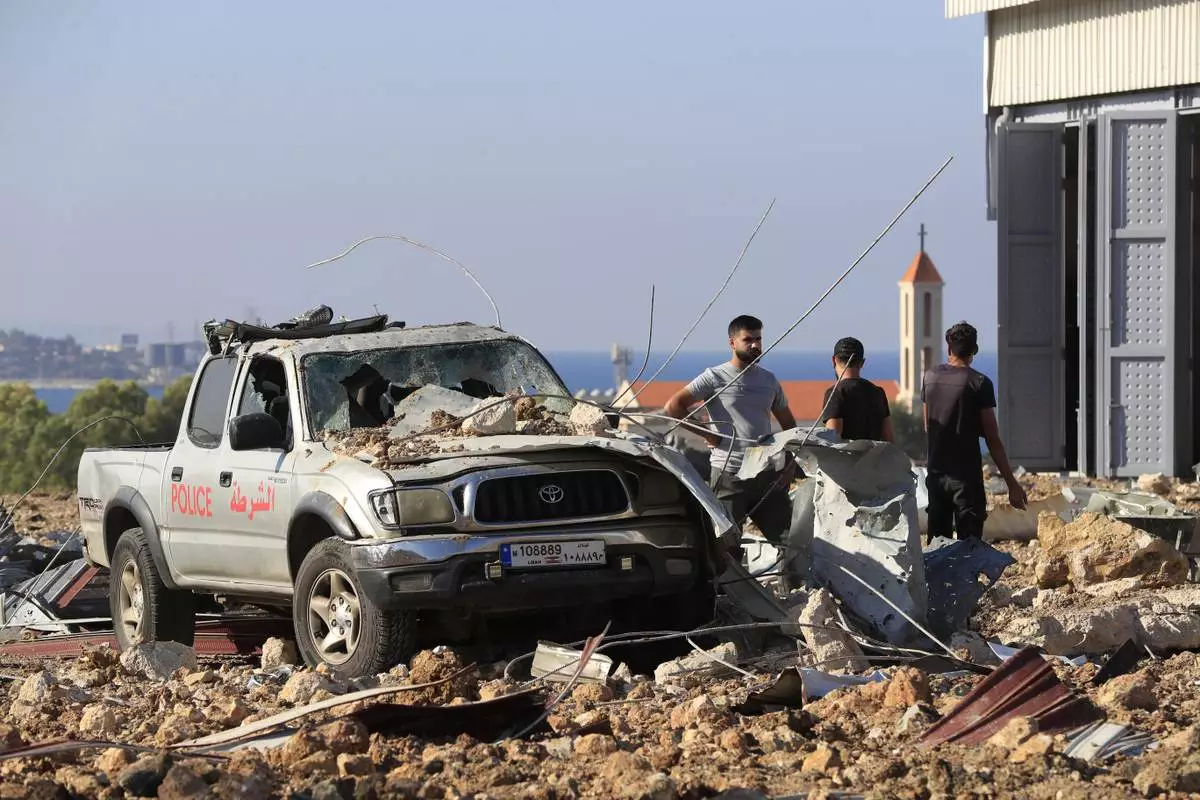
People gather near a damaged car at the site of an Israeli airstrike that hit a hangar in the southern town of Jiyeh, Lebanon, Wednesday, Sept. 25, 2024. (AP Photo/Mohammed Zaatari)
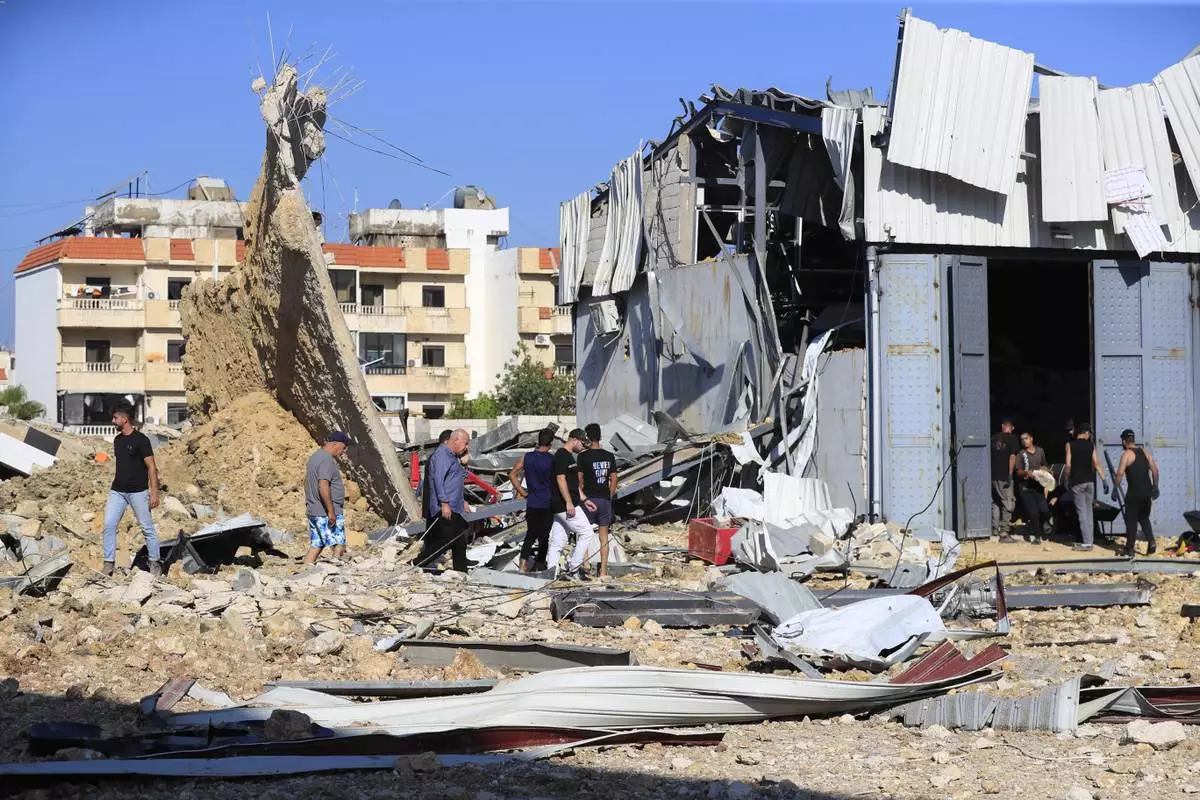
People gather at the site of an Israeli airstrike that hit a hangar in the southern town of Jiyeh, Lebanon, Wednesday, Sept. 25, 2024. (AP Photo/Mohammed Zaatari)
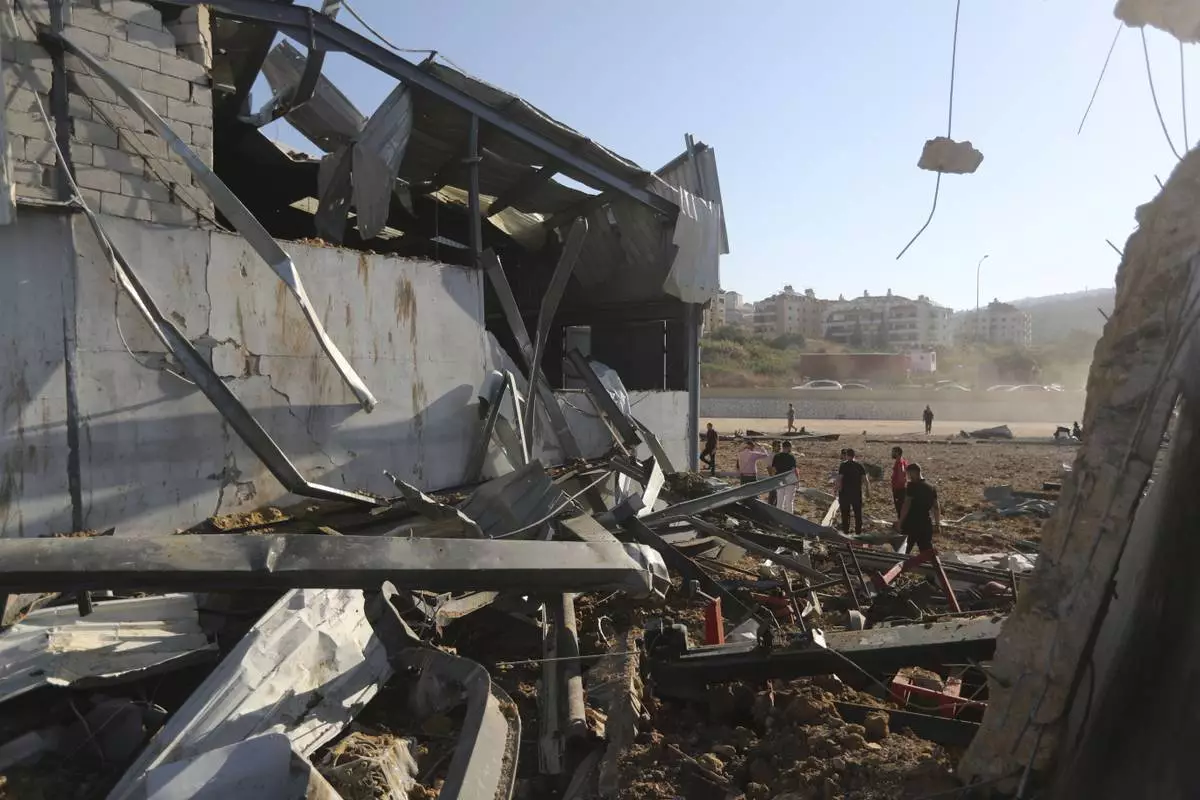
People gather at the site of an Israeli airstrike that hit a hangar in the southern town of Jiyeh, Lebanon, Wednesday, Sept. 25, 2024. (AP Photo/Mohammed Zaatari)
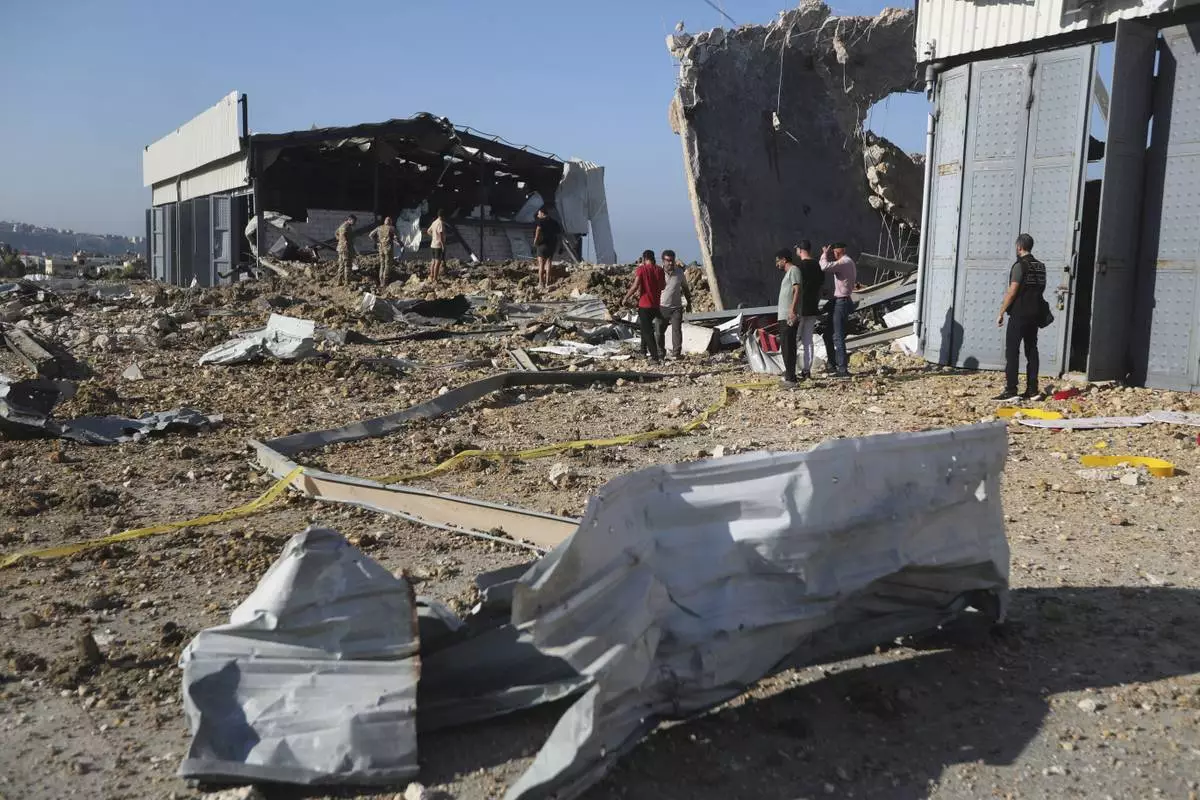
People gather near the site of an Israeli airstrike that hit a hangar in the southern town of Jiyeh, Lebanon, Wednesday, Sept. 25, 2024. (AP Photo/Mohammed Zaatari)

Residents cry as they walk past a building that was hit by an Israeli airstrike in Beirut's southern suburbs, Tuesday, Sept. 24, 2024. (AP Photo/Hassan Ammar)
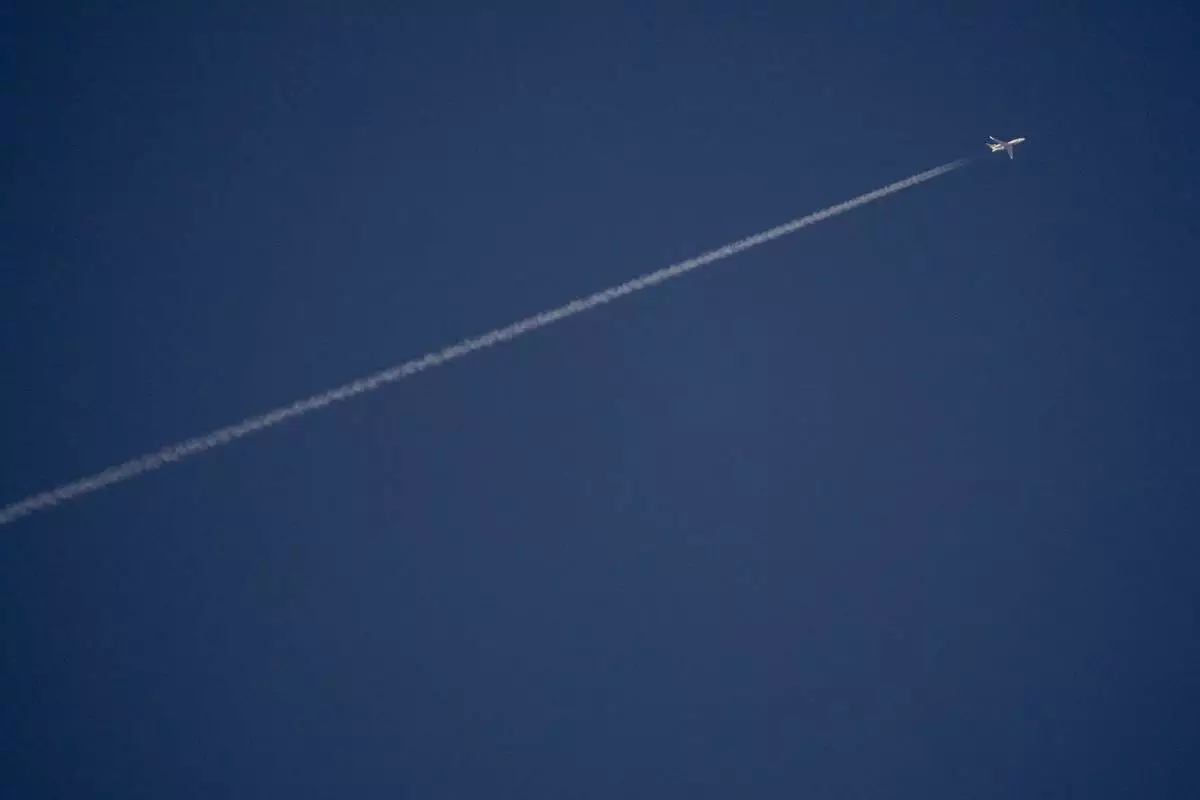
An Israeli surveillance aircraft seen from Hadera flies over the Mediterranean sea towards northern Israel, on Tuesday, Sept. 24, 2024. (AP Photo/Ariel Schalit)

Residents check the site of an Israeli airstrike in Beirut's southern suburbs, Tuesday, Sept. 24, 2024. (AP Photo/Hassan Ammar)

A forklift removes a damaged car as Lebanese army and emergency workers gather at the scene of an Israeli airstrike in Beirut's southern suburbs, Tuesday, Sept. 24, 2024. (AP Photo/Hassan Ammar)

A wounded man reacts at the scene of the building that was hit by an Israeli airstrike in Beirut's southern suburbs, Tuesday, Sept. 24, 2024. (AP Photo/Hassan Ammar)
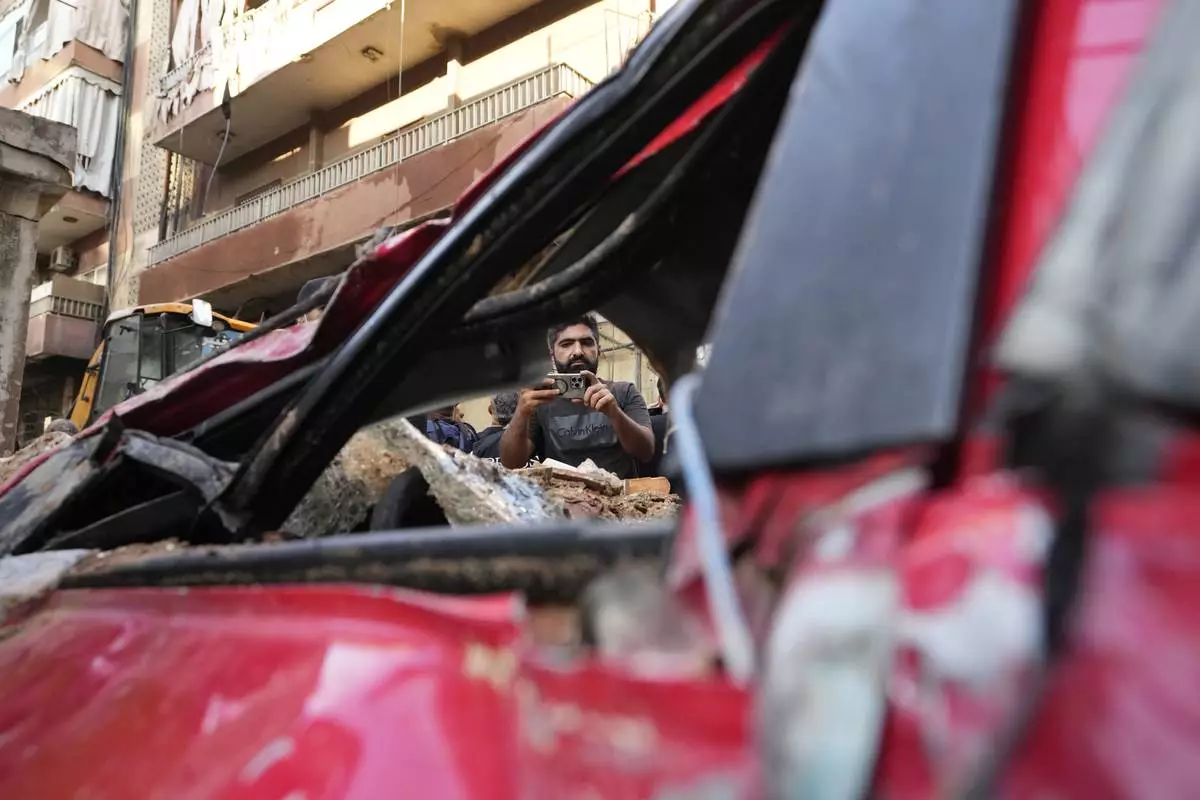
A man uses his mobile phone to document a damaged car at the scene of the building that was hit by an Israeli airstrike in Beirut's southern suburbs, Tuesday, Sept. 24, 2024. (AP Photo/Hassan Ammar)

Journalists gather at the scene of a building that was hit by an Israeli airstrike in Beirut's southern suburbs, Tuesday, Sept. 24, 2024. (AP Photo/Hassan Ammar)
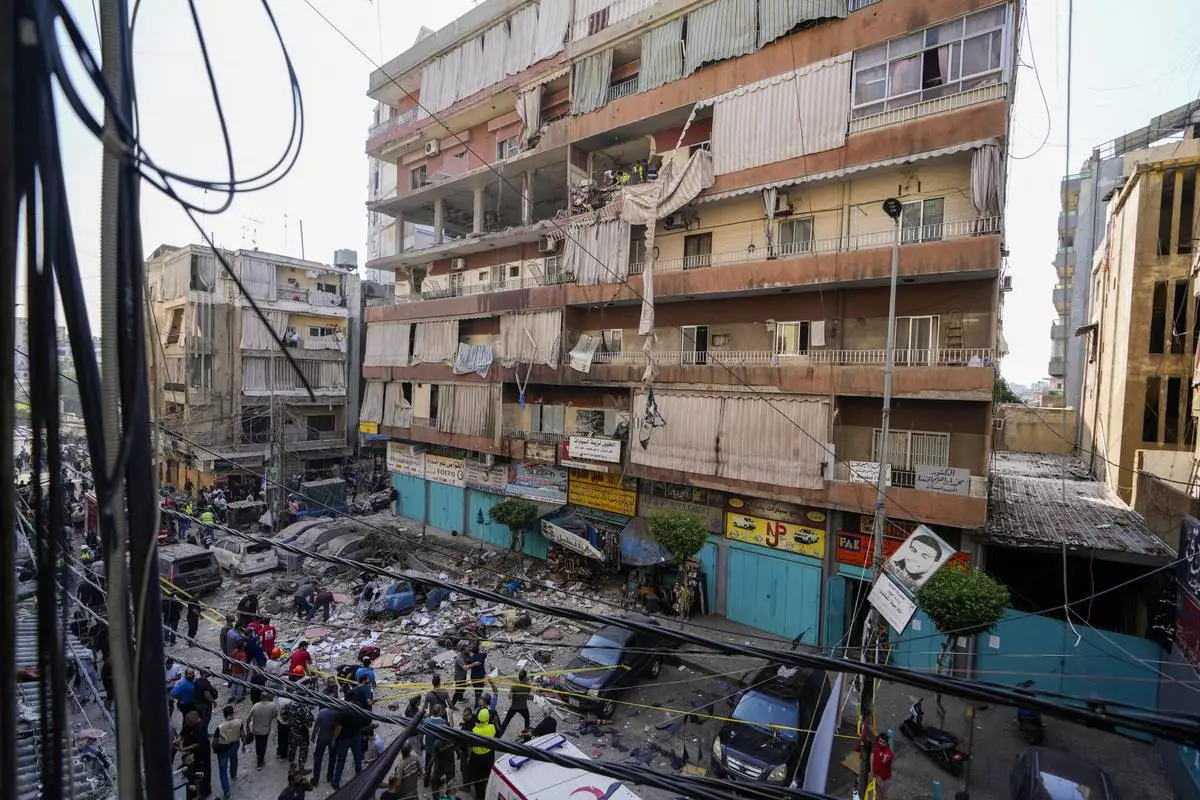
Residents and rescuers check a building that was hit by an Israeli airstrike in Beirut's southern suburbs, Tuesday, Sept. 24, 2024. (AP Photo/Hassan Ammar)
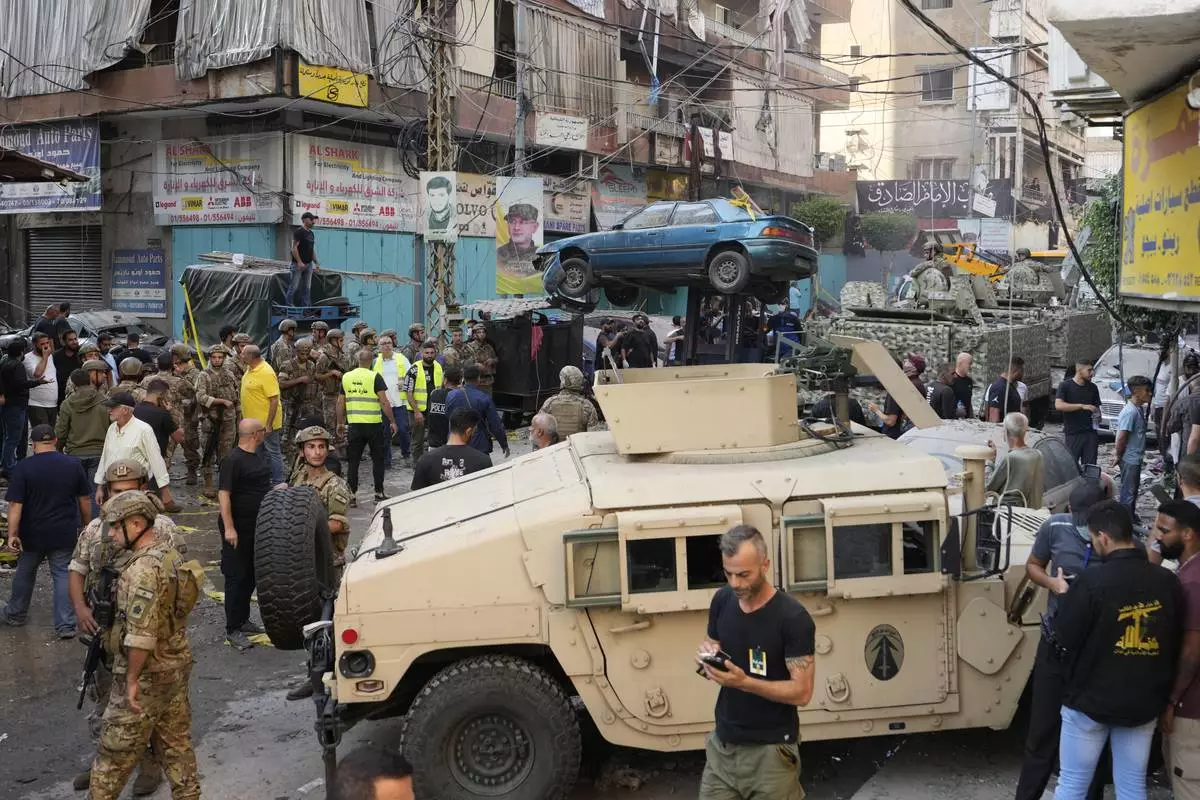
A forklift removes a damaged car as Lebanese army and emergency workers gather at the scene of an Israeli airstrike in Beirut's southern suburbs, Tuesday, Sept. 24, 2024. (AP Photo/Hassan Ammar)
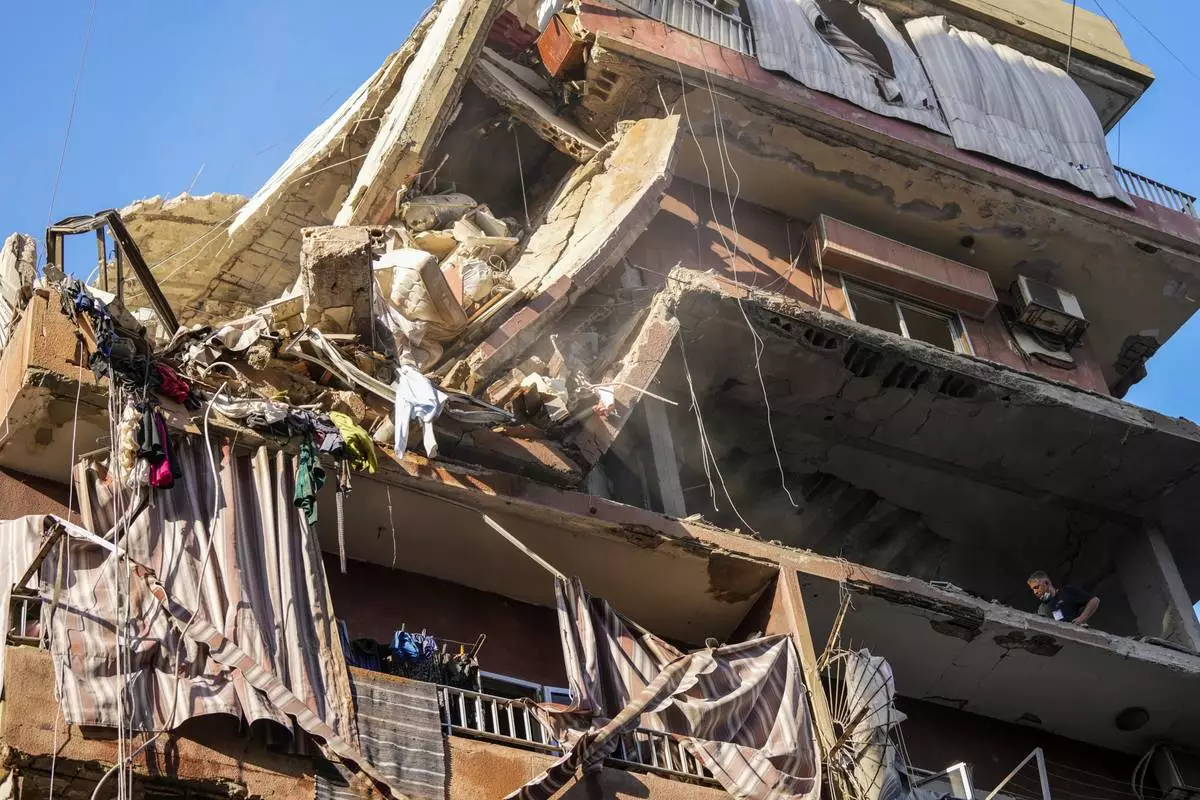
Residents check a partially destroyed building at the site of an Israeli airstrike in Beirut's southern suburbs, Tuesday, Sept. 24, 2024. (AP Photo/Hassan Ammar)
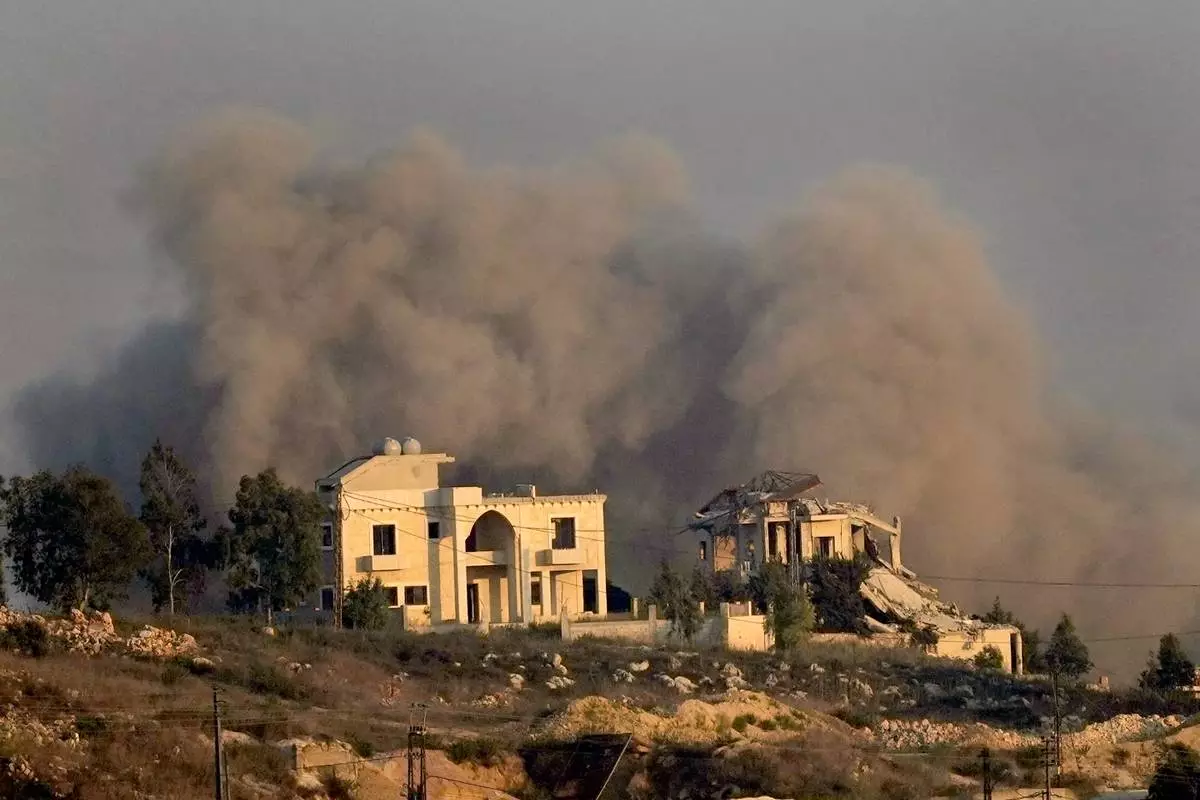
Smoke rises behind a destroyed house following an Israeli airstrike on Khiam village, as seen from Marjayoun town, south Lebanon, Tuesday, Sept. 24, 2024. (AP Photo/Hussein Malla)
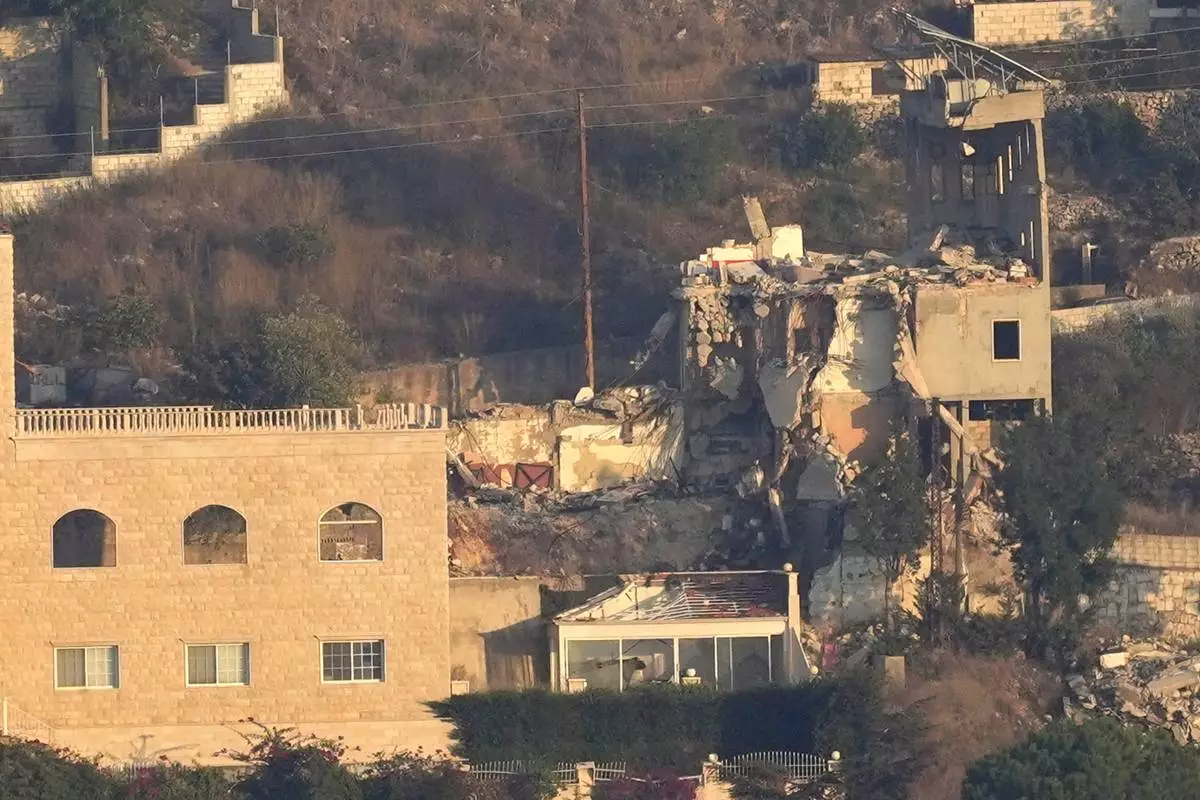
A destroyed house by an Israeli airstrike on Khiam village, as seen from Marjayoun town, south Lebanon, Tuesday, Sept. 24, 2024. (AP Photo/Hussein Malla)
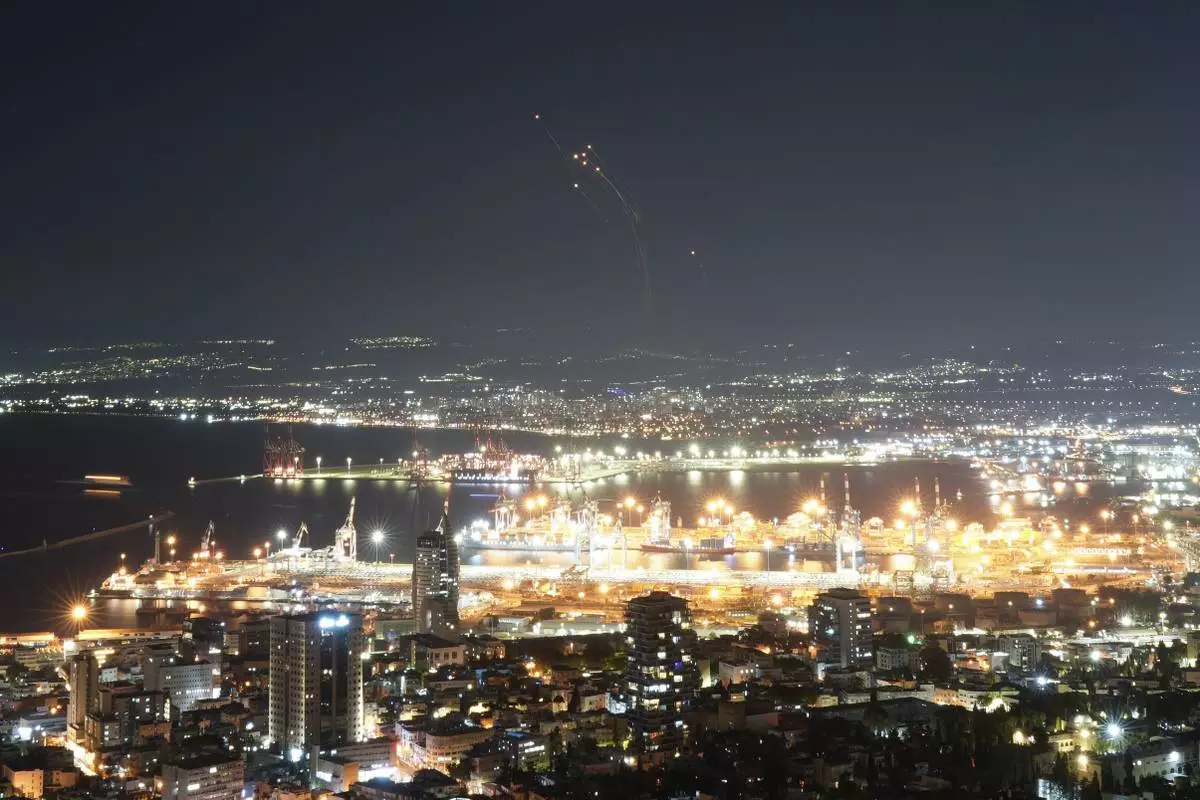
Israeli Iron Dome air defense system fires to intercept rockets that were launched from Lebanon, in northern Israel, Tuesday, Sept. 24, 2024. (AP Photo/Ohad Zwigenberg)



















































